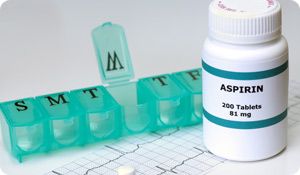
Pancreatic cancer is the fourth leading cause of cancer-related death in the U.S.; in 2015, itís estimated that it will kill more than 40,500 people, according to the American Cancer Society. Because it has few symptoms early on, itís not usually diagnosed until it is advanced. But there may be a way to help prevent it: aspirin. A recent study reports that taking low doses of aspirin (75 to 325 mg. daily) over many years lowers your risk of pancreatic cancer. The preventive effect was greatest in those who started taking aspirin 20 years before the study began.
Aspirin and Cancer Prevention
Scientists have studied the link between aspirin and cancer prevention for some time, with conflicting results.
A 2004 analysis of data from the Nursesí Health Study, published in the Journal of the National Cancer Institute, suggested that regular use of aspirin (for 20 years or more) was associated with an increased risk of pancreatic cancer. This finding contradicted earlier lab studies and animal models showing that aspirin and other non-steroidal anti-inflammatory drugs (NSAIDs, ibuprofen is a common NSAID) might reduce the risk of some cancers and precancerous lesions, and inhibit the development of pancreatic cancer.
More recently, the National Cancer Institute reviewed eight clinical trials that indicated a substantial reduction in mortality for several types of cancer when study subjects used aspirin regularly. However, none of these trials were specifically designed to assess whether aspirin reduced cancer incidence or death.
Michael Goggins, MD, a professor at Johns Hopkins Medical Institutions, discusses the most recent study on his blog, questioning whether it was the aspirin itself, or something else about this group of participants that prevented them from developing pancreatic cancer. Goggins writes that while the results suggest that regular long-term aspirin use can reduce the development of pancreatic cancer, the evidence is really inconclusive. So far, the best evidence suggests that aspirin may reduce the development of colon, rectal, and esophageal cancers.
However, as Kurtis A. Campbell, MD, a surgical oncologist at Mercy Medical Center in Baltimore, observes, "Most of the data relates to daily intake of low-dose aspirin (75-100 mg). The only study that looked at this relationship specifically in colon cancer used a [much higher] dose of 600 mg. daily."
The Bottom Line
According to Campbell, "There is an increasing body of evidence that long-term aspirin use may play a role in decreasing the risk of the development of solid malignant [cancerous] tumors and/or the development of metastatic disease [cancer that spreads] from these tumors." However, "There is a clear increased risk of both minor and major bleeding with aspirin use, some estimate as high as 50% increased risk of non-fatal bleeding episodes."
Cambell concludes, "Finally, what is also clear is the impact of aspirin on the risk reduction of solid malignant tumor development is associated with long-term use, likely a minimum of four to five years of consistent use. The risk-benefit ratio for an individual patient to use aspirin in the primary prevention of cancer should certainly be discussed with a primary care physician before beginning this therapy."
Kurtis A. Campbell, MD, FACS, reviewed this article.
Sources
Kurtis A. Campbell, MD. Surgical oncologist, Mercy Medical Center, Baltimore.
"A Snapshot of Pancreatic Cancer." National Cancer Institute. December 2, 2013.
>American Cancer Society. "Cancer Facts and Figures 2015." Atlanta: American Cancer Society, 2015.
Lowry, Fran. "Long-term Aspirin Use and Lower Pancreatic Cancer Risk." Medscape. June 30, 2014.
Goggins, Michael, MD. "Aspirin and Pancreatic Cancer." Pancreatic Cancer Blog at Johns Hopkins. Accessed July 7, 2014.
Streicher, Samantha A., Herbert Yu, Lingeng Lu, Mark S. Kidd, and Harvey A. Risch. "CaseĖControl Study of Aspirin Use and Risk of Pancreatic Cancer." Cancer Epidemiology Biomarkers & Prevention. June 26, 2014; doi: 10.1158/1055-9965.EPI-13-1284.
Barclay, Laurie, MD. "Prolonged Regular Aspirin Use May Increase Pancreatic Cancer Risk." Medscape. January 6, 2004.
"Can Aspirin Reduce Cancer Risk and Mortality?" National Cancer Institute. March 30, 2011.
Schernhammer, Eva S., Jae-Hee Kang, Andrew T. Chan, Dominique S. Michaud, Halcyon G. Skinner, Edward Giovannucci, Graham A. Colditz, and Charles S. Fuchs. "A Prospective Study of Aspirin Use and the Risk of Pancreatic Cancer in Women." NCI Journal of the National Cancer Institute 2004 96(1): 22-28.





